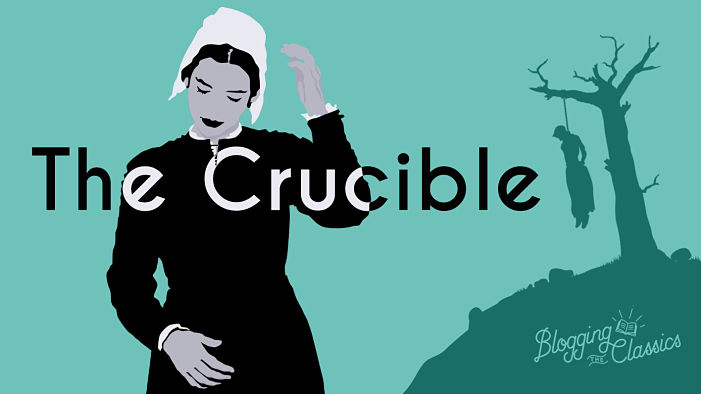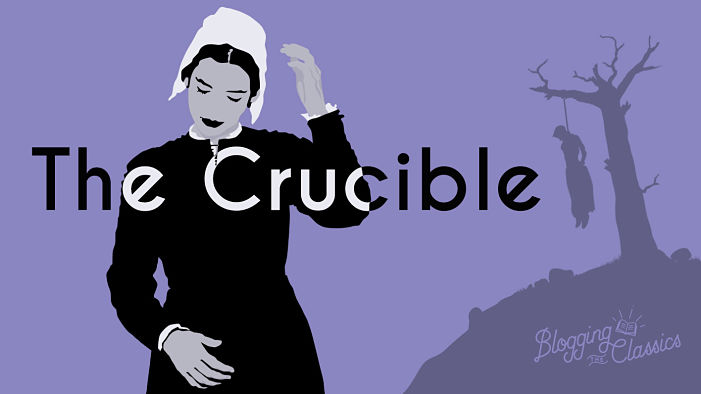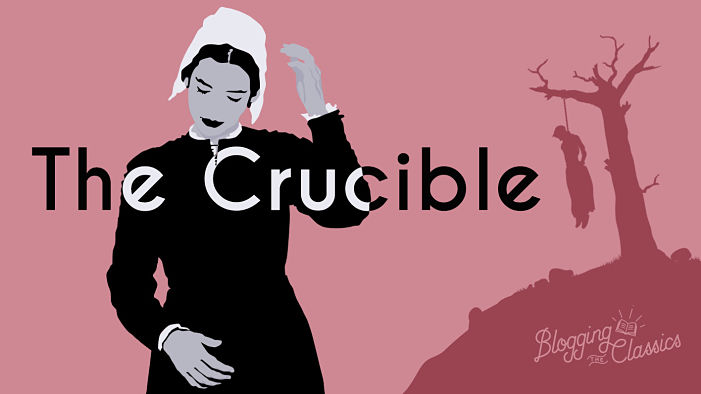The Crucible Act 3 Recap: The Yellow Bird of Satan

Hello and welcome back to The Crucible, the play that takes the song “Thank Heaven For Little Girls,” and says “that, but the opposite.”
In the first two acts, we saw accusations of witchcraft go from a childish prank to mass hysteria, and in Act 3 we watch the citizens of Salem take one last look at sanity as it disappears into the rearview mirror.
This act takes place in an anteroom of the Salem courtroom, where the trials are in full swing (unintentional hanging pun). The accused are being prosecuted by Marhall Herrick (who seems to hate people and feel that the fewer of them there are, the better) and judged by Thomas Danforth, who is quietly the worst person in the entire play.
The play picks up with Giles Corey (Old Dude Who Can Get It) desperately trying to free his wife, who will soon be condemned to hang. Sure, he brought up her propensity to read books in the dead of night during a witch trial, but he was just making conversation! He didn’t want her to be hanged, just appropriately chastised for being a better reader than he is!
In an attempt to free her, Giles has started a petition with 91 signatures attesting to the good character of the accused. He gives it to Judge Danforth who is like “Thank you so much, this is very helpful. I will have all these people arrested.” Obviously this was not what Corey in mind. He has another piece of evidence, proof that Putnam and others are using the trials to seize their neighbors’ land, but he refuses to cause any more damage by getting another witness involved.
The next person to try and throw his body on the gears of the machine is John Proctor, who drags Mary Warren into court to confess that she made up all her testimony. Judge Danforth agrees to at least hear her out and she bravely recants everything. But Putnam, Herrick, and Parris are really not trying to hear that, so they insist that Mary herself is being compelled by the devil or John Proctor (same diff) to lie.
Danforth, fair and impartial judge that he is, asks to hear what the other afflicted girls make of this, so he calls in Abigail and the rest of the Teenage Morality Squad. They deny the charges and start repeating everything that Mary Warren says in the time-honored manner of three year-olds. As if that isn’t horrifying enough, Abigail then pretends that Mary Warren has taken the form of a yellow bird who is perched on the rafters and preparing to claw out their eyes. And the power of Abigail’s personality is so intense that every adult in the room is terrified. Even Mary Warren begins to doubt herself, and finally breaks down and recants her recant.
Now, horror is a difficult thing to achieve in the theatre, but even a halfway decent production of The Crucible can’t fail to give you chills in this scene. Arthur Miller leans a little too far on the wickedness of adolescent girls in his explanation of Salem for my tastes, but in this scene you can’t help but feel that something real is taking place. It’s real because of the frenzy the girls work each other into and because of the very real effects it’s about to have on innocent lives.
And underneath the shrieking of the girls, there’s another type of horror: the sheer momentum of the trials, which has taken on a life of its own. That’s why Danforth is the worst character of the play. Abigail is a sociopath, yes, but she’s only able to cause the kind of damage she does because she is given a soap box. Putnam and Parris are both vain and greedy men, but they rely of the apparatus of the state to actually kill people. It’s Danforth who keeps the trials going even in the face of Giles’ and John Proctor’s evidence. And he does it only because to turn back now would be to admit he was wrong the entire time. It’s kind of like when you realize you are walking in the wrong direction but are too embarrassed to turn around, so you just keep going. (Except with hanging people.)
Following Abigail’s outburst, John Proctor plays his final card and confesses that he did the do with Abigail, and this whole spectacle has been the product of her lust and vengeance (the idea that she is a “whore” and he is merely a weak man is never seriously questioned). He also swears that his wife Elizabeth can never tell a lie.
So Judge Danforth brings in Elizabeth, forbids her from looking at either John or Abigail (it’s like a horrific game show), and asks if John ever cheated. Trying to protect his honor, Elizabeth lies, so Danforth throws out both her and John’s testimony, and to the immense relief of everyone involved, gets back to hanging people.
John is arrested, crying out “God is dead!” because he is so original.
See you next week for Act four. (Spoiler alert: things do not get better.)
Catch up on the whole play here!














